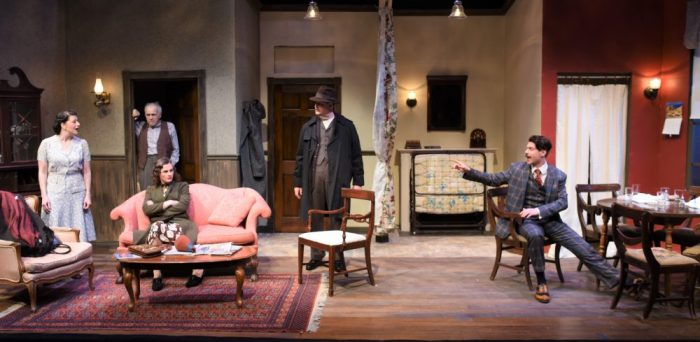
Awake and Sing! by Clifford Odets. Quintessence Theatre Group at the Sedgwick Theatre in Philadelphia through February 24, 2019. Max Shulman directs.
Awake and Sing! dramatizes issues that were urgent in the 1930s and still resonate today — economic hardship, a huge gap in wealth, distrust of government, and a disconnect between dreams and reality. The title comes from the Book of Isaiah: “Awake and sing, you who dwell in the dust.”
Three generations of Bergers live in a crowded fifth-floor walk-up apartment next to the El in the Bronx in 1933, in the depths of the Depression. Jobs are precarious. Families are being evicted from their homes. Suicides are a daily occasion in the neighborhood.
Bessie is a domineering mother as she struggles to keep her family afloat. She insults her meek husband Myron and is dismissive of her socialist father Jacob who came over from Russia. She undermines the romantic aspirations of her son Ralphie. When she learns that her daughter Hennie is pregnant, Bessie forces her into a loveless marriage with an unsuspecting immigrant boy.
To supplement their meager income, the Bergers accept a boarder, Moe Axelrod, who lost a leg fighting in the World War. He is always hanging around, talking tough and insulting the family members, but they need the rent he pays them. (He receives a monthly stipend from the government because of his war injury.) Moe and Hennie are constantly sparring with each other, and there’s a hint that they have had sex, but he’s not the man who impregnated her.
Both Moe and Grandpa Jacob are disillusioned by America with its huge wealth gap; they are convinced that the war was instigated by industrialists for their financial gain. Moe’s response is to gamble and to join get-rich schemes. Jacob’s is to preach Marxism and escape reality by listening to Caruso records — especially the aria O Paradiso about a land of paradise.
Our attention is riveted by Ralphie, an idealistic young man unhappily working as a clerk. Jacob urges his grandson to go out on his own and create the new world — the paradise — that they both desire. He advises, “Life shouldn’t be printed on dollar bills. Take the world in your two hands and make it like new.”
Bessie is a fascinating character, as we realize the good intentions behind her harsh actions. In the end, she confesses that she too wished to run away, just as her children do now. And Moe supplies colorful lines such as “I got a yen for her, and I don’t mean a Chinese coin” and “Make a break, or spend the rest of your life in a coffin.”
Playwright Odets had a talent for creating multiple characters who each have a central part in the drama. This play reminds us of Chekhov in the way the characters interact as they trudge through their daily activities. Then it morphs into a drama with surprising twists and heart-wrenching developments.
Clifford Odets was born and raised in Philadelphia, the son of Leib Gorodetsky. He spent considerable time at the center-city home of Morris Leof who was involved in left-wing politics. By coincidence, my father knew the Leofs, and I was friendly with the Gorodetskys, four of whom played in the Philadelphia Orchestra. In addition, I knew the actor Morris Carnovsky who was Grandpa Jacob in the 1935 premiere of Awake and Sing! Because of these circumstances, I feel a special connection with the people in this play.
Odets became a member of Group Theatre, a 1930s collective that produced plays with social significance. For them, he wrote Waiting for Lefty, Golden Boy and Awake and Sing! (The exclamation point is part of the title.) His great gift was his use of colloquial urban speech. Although he became rich and famous in Hollywood, he showed a unique understanding of the working class. His Golden Boy was made into a film and a musical of the same name. The Flowering Peach was the basis for the Richard Rodgers musical Two by Two. Odets’s screenplay for Sweet Smell of Success was the basis for a musical by that name.
The original cast of Awake and Sing! included names that are legendary in theater history, including Carnovsky, Luther Adler, Stella Adler, John Garfield and Phoebe Brand. This production by Quintessence Theatre is directed by Max Shulman, famed as a chronicler of theatrical history, especially Jewish theater, and he shows a sure hand for pacing and for naturalistic acting.
Sabrina Profitt dominates the cast with her vigorous portrayal of Bessie. The distinguished Lawrence Pressman anchors the play as a touching Jacob. Lee Cortopassi is impressive as Moe, whose speech often is nasty and racist but he’s not a villain. DJ Gleason, whom we admired as the boyish lead in Neil Simon’s Biloxi Blues, is lovable as Ralphie. Fine work comes from Bradley Mott as husband Myron, Melody Ladd as Hennie, Buzz Roddy as Uncle Morty, Trevor William Fayle as the immigrant Sam, and Steve Conner as Schlosser.
The set by Meghan Jones is a realistic image of a 1930s apartment, with dining room and living room alongside each other, separated by a curtain. The costumes by Summer Lee Jack look authentic. My only complaint is inadequate dialect coaching; there’s too much variance in the speech of supposed family members.
Below, poster from the 1930s:
